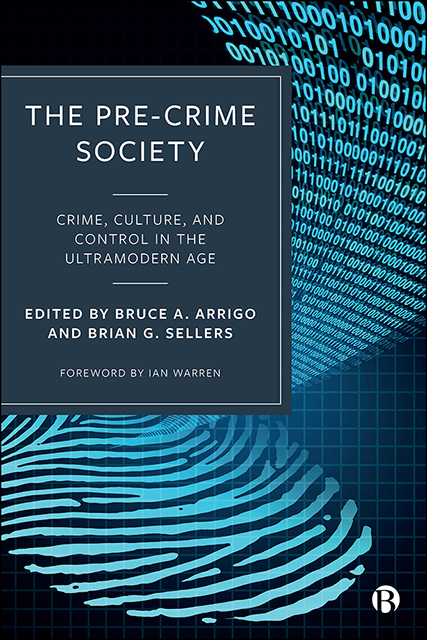Book contents
- Frontmatter
- Dedication
- Contents
- Notes on Contributors
- Foreword
- Introduction: The Ultramodern Age of Criminology, Control Societies and ‘Dividual’ Justice Policy
- Part I Theories, Theorists and Theoretical Perspectives
- Part II Institutions, Organizations and the Surveillance Industrial Complex
- Part III Dataveillance, Governance and Policing Control Societies
- Part IV Systems of Surveillance, Discipline and the New Penology
- Part V Globalizing Surveillance, Human Rights and (In)Security
- Afterword: ‘Pre-Crime’ Technologies and the Myth of Race Neutrality
- Index
2 - The Security Society: On Power, Surveillance and Punishments
Published online by Cambridge University Press: 14 April 2023
- Frontmatter
- Dedication
- Contents
- Notes on Contributors
- Foreword
- Introduction: The Ultramodern Age of Criminology, Control Societies and ‘Dividual’ Justice Policy
- Part I Theories, Theorists and Theoretical Perspectives
- Part II Institutions, Organizations and the Surveillance Industrial Complex
- Part III Dataveillance, Governance and Policing Control Societies
- Part IV Systems of Surveillance, Discipline and the New Penology
- Part V Globalizing Surveillance, Human Rights and (In)Security
- Afterword: ‘Pre-Crime’ Technologies and the Myth of Race Neutrality
- Index
Summary
Introduction
A couple of years ago, on a rainy Sunday afternoon, at 1:30 PM, I went to a Sparta Rotterdam football game. Never before had I felt so conscious of the security regimes that permeated my movement across the city. I’ve supported the Dutch football club Sparta Rotterdam for many decades—I’m a season ticket holder. Just as I was leaving for the Sunday game, a policeman patrolling the street by car told me that he was on the lookout for somebody who looked just like me—a handsome, dark haired guy with a slightly overdue shave. According to the Dutch predictive policing system, a data-driven system that predicts crimes through statistics based on different data sources, a number of burglars are active in my neighborhood. Convincing him that I wasn't the burglar he was looking for wasn't too hard, but the incident played on my mind as I made my way to the game. I started noticing the number of sound sensors and digital cameras put up by the local government in my neighborhood. I’d just read an article about the implementation of facial recognition systems, and I imagined the images of my face being processed by a databank and compared with the photos of thousands of criminals.
Around half past one, I went into the local shop to grab something to eat during the game. A sticker in the window told me that this shop participated in the Collective Shop Ban project—misbehave here (steal a candy bar, for example) and I’d be banned from the hundreds of shops, banks, restaurants and cinemas participating in the project. Deciding which route to take, the navigation app on my smart phone advised me to use the subway instead of the bus to the stadium of Sparta Rotterdam. By taking this route, I avoid city areas that have high crime intensity and are identified as ‘hotspots’ or ‘hotspot areas’. As I walked to the nearby subway, I noticed the municipality installed bars across the middle of benches as a way to stop homeless people from sleeping on them.
By taking the subway, I entered another highly controlled zone. Rotterdam's subway system requires passengers to use an electronic pass, preferably personalized (an anonymous one expires every year), which according to the promotion team is ‘easy, fast, and safe’.
- Type
- Chapter
- Information
- The Pre-Crime SocietyCrime, Culture and Control in the Ultramodern Age, pp. 43 - 62Publisher: Bristol University PressPrint publication year: 2021

